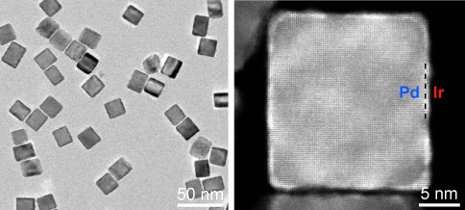New catalyst yields more accurate PSA test

Say you've been diagnosed with prostate cancer, the second-leading cause of cancer death in men. You opt for surgery to remove your prostate. Three months later, a prostate surface antigen (PSA) test shows no prostate cells in your body. Everyone rejoices.
Until 18 months later, when another PSA test reveals that now prostate cells have reappeared. What happened?
The first PSA test yielded what's known as a false negative result. It did not detect the handful of cells that remained after surgery and later multiplied. Now a chemist at Michigan Technological University has made a discovery that could, among other things, slash the numbers of false negatives in PSA tests.
Xiaohu Xia and his team, including researchers from Louisiana State University and the University of Texas at Dallas, have developed a new catalyst that could make lab tests like the PSA much more sensitive. And it may even speed up reactions that neutralize toxic industrial chemicals before they enter lakes and streams.
A paper on the research, "Pd–Ir Core–Shell Nanocubes: A Type of Highly Efficient and Versatile Peroxidase Mimic," was published online Sept. 3 in ACS Nano. In addition to Xia, coauthors are graduate students Jingtuo Zhang, Jiabin Liu and Haihang Ye and undergraduate Erin McKenzie of Michigan Tech; Moon J. Kim and Ning Lu of the University of Texas at Dallas; and Ye Xu and Kushal Ghale of Louisiana State University. The LSU team conducted theoretical calculations, and the UT Dallas team contributed high-resolution electron microscopy images.
Peroxidase Mimic
Their new catalyst mimics the action of similar biochemicals found in nature, called peroxidases. "In animals and plants, these peroxidases are important— for example, they get rid of hydrogen peroxide, which is harmful to the organism," said Xia, an assistant professor of chemistry at Michigan Tech. In medicine, peroxidases have become powerful tools for accelerating chemical reactions in diagnostic tests; a peroxidase found in the horseradish root is commonly used in the standard PSA test.
However, these natural peroxidases have drawbacks. They can be difficult to extract and purify. "And, they are made of protein, which isn't very stable," Xia explained. "At high temperatures, they cook, like meat."
"Moreover, their efficiency is just fair," he added. "We wanted to develop a mimic peroxidase that was substantially more efficient than the natural peroxidase, which would lead to a more-sensitive PSA test."
Hundred-fold More Sensitive PSA Test
Their new catalyst, made from nanoscale cubes of palladium coated with a few layers of iridium atoms, does just that. PSA tests Xia's team conducted using the palladium-iridium catalyst were 110 times more sensitive than tests completed with the conventional peroxidase.
"After surgery, it's vital to detect a tiny amount of prostate antigen, because otherwise you can get a false negative and perhaps delay treatment for cancer," said Xia. "Our ultimate goal is to further refine our system for use in clinical diagnostic laboratories."
Xia hopes that his mimic peroxidase will someday save lives through earlier detection of cancer and other maladies. He also plans to explore other applications, including how it compares with horseradish peroxidase in other catalytic reactions: breaking down toxic industrial-waste products like phenols into harmless substances.
Finally, the team wants to better understand why its palladium-iridium catalyst works so well. "We know the iridium coating is the key," Xia said. "We think it makes the surface sticky, so the chemical reagents bind to it better."
More information: Pd–Ir Core–Shell Nanocubes: A Type of Highly Efficient and Versatile Peroxidase Mimic, ACS Nano, Article ASAP. DOI: 10.1021/acsnano.5b03525
Abstract
Peroxidase mimics with dimensions on the nanoscale have received great interest as emerging artificial enzymes for biomedicine and environmental protection. While a variety of peroxidase mimics have been actively developed recently, limited progress has been made toward improving their catalytic efficiency. In this study, we report a type of highly efficient peroxidase mimic that was engineered by depositing Ir atoms as ultrathin skins (a few atomic layers) on Pd nanocubes (i.e., Pd–Ir cubes). The Pd–Ir cubes exhibited significantly enhanced efficiency, with catalytic constants more than 20- and 400-fold higher than those of the initial Pd cubes and horseradish peroxidase (HRP), respectively. As a proof-of-concept demonstration, the Pd–Ir cubes were applied to the colorimetric enzyme-linked immunosorbent assay (ELISA) of human prostate surface antigen (PSA) with a detection limit of 0.67 pg/mL, which is ∼110-fold lower than that of the conventional HRP-based ELISA using the same set of antibodies and the same procedure.
Journal information: ACS Nano
Provided by Michigan Technological University

















